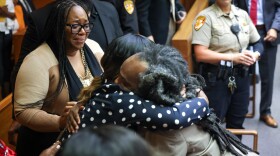Glimpses of poverty can be seen across North Carolina on a daily basis. From median strips to emergency rooms and school cafeterias to unemployment offices, no communities are immune.
In Greensboro many people in need use the Interactive Resource Center (IRC) for daily access to computers, showers, and a sense of community. More than 200 people visit the center each weekday.
"I went from $80,000 a year to, I'm lucky if I make $80 a month," says Earl Zayack, a slender man with brown hair and a salty goatee.
"So it was a huge, humbling experience for me."
Each day, Zayack walks the five miles to the downtown IRC from his tent.
Earl worked for 30 years doing cement jobs, often as part of home renovations. That allowed him to pay the bills, raise eight kids and own a house. He moved here from Delaware after getting divorced and has been homeless since January. So far, no steady work.
"The job opportunities could be a lot better, because you apply online and most of the companies say 'I will get back to you,' and you never hear anything from them. They see that you're homeless and they don't even want to give you a chance."
Zayack is part of a population in Greensboro that is expanding. According to a report released earlier this summer by the Brookings Institute, nearly one out of every five people in Greensboro is living below the federal poverty line. That means about 50,000 people in total.
"This has been a slow, laborious, turgid recovery," says Andrew Brod, professor of economics at UNC-Greensboro. On Wednesday, he gave an overview of the Brookings study to several mayors and an audience of about 100 people at a poverty summit in Greensboro. He says poverty has increased in rural and suburban areas, while becoming the most severe in many urban neighborhoods.
"You know, the fact that poverty hasn't recovered, that the poverty rate hasn't fallen, is very much a result of the economy not really improving much since the end of the recession," Brod added.
It's actually getting worse. Raleigh, Greensboro, Winston-Salem, High Point and Charlotte have all seen significant increases in the percentage of people living in poverty since 2000. Those five are listed in the Brookings report as among the ten U.S. Metro areas where poverty is growing fastest. Following that report, Greensboro mayor Nancy Vaughan called for this event. She sees it as a jumping-off point:
"I didn't think we would come away with today the 'Ah, I got it. This is what we have to do.' This is an issue that has been going on for decades. We weren't going to solve it in one meeting," Vaughan said.
At the summit, mayors Bill Bell of Durham and Allen Joines of Winston-Salem spoke about initiatives taking place in those cities. Vaughan is interested in working with other mayors on a plan to try to reduce poverty. She says their collective approach may include going to the General Assembly and asking for more powers at the local level.
"One thing we could certainly go and talk to them about is Medicaid expansion; that if we could address healthcare issues, that goes a long way in addressing other subsequent issues. That might be something that as mayors we can band together with. We have to look at what was discussed today to see how the legislature how can assist us and maybe by assisting us, it's just getting out of the way," Vaughan said.
The conversation was led by elected officials, something several in the audience criticized.
"I think future summits moving forward have to include advocates and organizations that do work on the ground with communities affected by poverty. Without those voices at the table, you're not having as meaningful a conversation as you would otherwise," said Michelle Kennedy, the Executive Director at the IRC.
She works with people who are struggling each day; people like Earl Zayack, who are trying to find their next meal, full-time work, and a way out of poverty.
"My long-term goal is actually getting another house. I mean, I've had them before and I'm not going to let this situation keep me down, and I just keep my nose above the water and keep on treadin'," Zayack said.
Greensboro's mayor wants another poverty summit later this fall.







